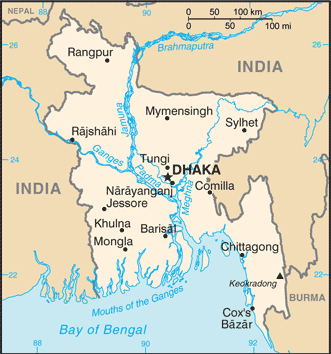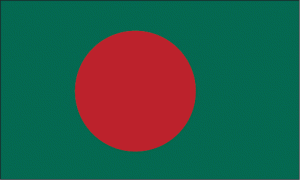Bangladesh
 Aglow Leader: Regional Committee
Aglow Leader: Regional Committee
Capital: Dhaka
Pray:
- Pray for the Aglow groups and leaders to be strengthened.
- Pray for all the resources and creativity needed to fulfill the intentions of God in the nation of Bangladesh.
- Pray for the Aglow prayer group in the Capital city.
- Pray for godly government leaders. Blessed is the nation whose God is The Lord, the people whom He has chosen for His own inheritance. Psalm 33:12
Proclaim:
- Arise, shine; for your light has come! And the glory of the LORD is risen upon you. For behold, the darkness shall cover the earth, and deep darkness the people; but the LORD will arise over you, and His glory will be seen upon you. Isaiah 60:1,2 (NKJV)
- Lift up your heads, O you gates! Lift up, you everlasting doors! And the King of glory shall come in. Who is this King of glory? The Lord of hosts, He is he King of glory. Selah Psalm 24:9-10 (NKJV)
Interesting Facts About Bangladesh
 Background: The huge delta region formed at the confluence of the Ganges and Brahmaputra River systems – now referred to as Bangladesh – was a loosely incorporated outpost of various empires centered on the Gangetic plain for much of the first millennium A.D. Muslim conversions and settlement in the region began in the 10th century, primarily from Arab and Persian traders and preachers. Europeans established trading posts in the area in the 16th century. Eventually the area known as Bengal, primarily Hindu in the western section and mostly Muslim in the eastern half, became part of British India. Partition in 1947 resulted in an eastern wing of Pakistan in the Muslim-majority area, which became East Pakistan. Calls for greater autonomy and animosity between the eastern and western wings of Pakistan led to a Bengali independence movement. That movement, led by the Awami League (AL) and supported by India, won the independence war for Bangladesh in 1971.
Background: The huge delta region formed at the confluence of the Ganges and Brahmaputra River systems – now referred to as Bangladesh – was a loosely incorporated outpost of various empires centered on the Gangetic plain for much of the first millennium A.D. Muslim conversions and settlement in the region began in the 10th century, primarily from Arab and Persian traders and preachers. Europeans established trading posts in the area in the 16th century. Eventually the area known as Bengal, primarily Hindu in the western section and mostly Muslim in the eastern half, became part of British India. Partition in 1947 resulted in an eastern wing of Pakistan in the Muslim-majority area, which became East Pakistan. Calls for greater autonomy and animosity between the eastern and western wings of Pakistan led to a Bengali independence movement. That movement, led by the Awami League (AL) and supported by India, won the independence war for Bangladesh in 1971.
The post-independence AL government faced daunting challenges and in 1975 it was overthrown by the military, triggering a series of military coups that resulted in a military-backed government and subsequent creation of the Bangladesh Nationalist Party (BNP) in 1978. That government also ended in a coup in 1981, followed by military-backed rule until democratic elections occurred in 1991. The BNP and AL have alternated in power since 1991, with the exception of a military-backed, emergency caretaker regime that suspended parliamentary elections planned for January 2007 in an effort to reform the political system and root out corruption. That government returned the country to fully democratic rule in December 2008 with the election of the AL and Prime Minister Sheikh HASINA. In January 2014, the incumbent AL won the national election by an overwhelming majority after the BNP boycotted the election, which extended HASINA’s term as prime minister.
In December 2018, HASINA secured a third consecutive term (fourth overall) with the AL coalition securing 96% of available seats, amid widespread claims of election irregularities. With the help of international development assistance, Bangladesh has reduced the poverty rate from over half of the population to less than a third, achieved Millennium Development Goals for maternal and child health, and made great progress in food security since independence. The economy has grown at an annual average of about 6% for the last two decades and the country reached World Bank lower-middle income status in 2014.
Government Type: parliamentary republic
Population: 164,098,818 (July 2021 est.)
Ethnic Groups: Bengali at least 98%, other indigenous ethnic groups 1.1% (2011 est.)
Languages: Bangla 98.8% (official, also known as Bengali), other 1.2% (2011 est.)
Religions: Muslim 89.1%, Hindu 10%, other 0.9% (includes Buddhist, Christian) (2013 est.)
Interesting Facts information from the cia.gov website. Read more about Bangladesh
